VMware Users Face Broadcom's Strict Measures: Why the Tightening Grip?
Broadcom's acquisition of VMware has sent ripples throughout the tech world, and those ripples are now turning into waves for VMware users. Many are facing stricter licensing terms and increased scrutiny, leading to questions and concerns about the future of their VMware deployments. But why is Broadcom tightening the screws? Let's delve into the reasons behind these changes.
The Acquisition's Impact: More Than Just a Name Change
The $61 billion acquisition wasn't just a simple corporate merger; it signaled a shift in strategy for VMware. Broadcom, known for its semiconductor and infrastructure software businesses, is taking a more aggressive approach to maximizing its investment. This approach is manifesting itself in several ways, directly impacting VMware's user base.
Why the Stricter Measures? Three Key Factors:
-
Increased Profitability: The primary driver is simple: profit. Broadcom aims to increase the overall profitability of its newly acquired asset. This means scrutinizing licensing agreements, cracking down on non-compliance, and potentially pushing users towards more expensive licensing models. This is a common tactic after large acquisitions, as the acquiring company seeks to optimize its return on investment.
-
Consolidation and Streamlining: Broadcom likely sees opportunities for streamlining VMware's product portfolio and licensing structures. This might involve phasing out older products or consolidating them into newer, more profitable offerings. This process often leads to temporary disruptions and stricter enforcement of existing licensing agreements.
-
Enhanced Security and Compliance: While potentially benefiting users in the long run, Broadcom might be implementing stricter measures to improve security and ensure compliance with industry regulations. This could involve increased audits, more rigorous license key verification, and potentially even penalties for non-compliance.
What This Means for VMware Users:
These changes translate into several potential challenges for VMware users:
-
Higher Licensing Costs: Expect increased scrutiny of your current licensing arrangements, potentially leading to higher costs or the need to upgrade to newer, more expensive licenses.
-
More Rigorous Audits: Be prepared for more frequent and thorough audits to ensure compliance with Broadcom's licensing terms. Non-compliance can result in hefty penalties.
-
Changes to Support and Maintenance: Support and maintenance policies may change, potentially impacting access to updates, patches, and technical assistance.
Navigating the Changing Landscape:
VMware users need to proactively address these changes:
-
Review Your Licensing Agreements: Thoroughly examine your current VMware licensing agreements to ensure full understanding and compliance with the updated terms.
-
Engage with Broadcom/VMware Support: Reach out to Broadcom/VMware support to clarify any uncertainties regarding licensing, support, and future product plans.
-
Consider a Licensing Optimization Strategy: Consult with a qualified VMware licensing expert to assess your current setup and identify opportunities for cost optimization and compliance.
The Future of VMware Under Broadcom:
The long-term implications of Broadcom's ownership remain to be seen. While some users may experience increased costs and stricter enforcement, others might benefit from improved security and potentially innovative new products. The key for now is to stay informed, proactive, and prepared for the changes ahead.
Keywords: VMware, Broadcom, acquisition, licensing, costs, compliance, audit, security, support, maintenance, VMware licensing optimization, VMware future, Broadcom VMware strategy.

